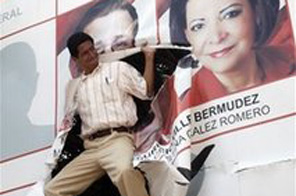Honduras: Venezuelan envoys expelled
TEGUCIGALPA: Honduras' interim government ordered Venezuelan diplomats on Tuesday to leave the country as the international community threatened new sanctions on the Central American nation if negotiations fail to resolve the crisis.
Venezuelan Embassy charge d'affaires Ariel Vargas said he received a letter from the Honduran Foreign Ministry ordering his diplomats to leave in 72 hours.
Venezuelan President Hugo Chavez has been the most vociferous critic of what he calls the "gorilla" government that overthrew his ally Manuel Zelaya on June 28.
The government of Roberto Micheletti, whom congress swore in as president after the coup, accused Venezuela of meddling in its affairs and of threatening to use its armed forces against Honduras, according to a copy of the letter obtained by The Associated Press.
Vargas dismissed the allegations and — holed up in the embassy along with a consular officer also affected by the order — vowed to defy it.
"We only have relations with the government of President Manuel Zelaya," Vargas told reporters outside the building. He said the expulsion order "does not exist for us, because the Micheletti government does not exist. It is a usurper government, a coup government, a government that is not recognized by anyone on an international level."
The Micheletti government did not say if it would take any measures to force the Venezuelans to leave.
"We hope that they obey the request," said Marta Lorena Alvarado, assistant foreign affairs minister. She also announced Honduras was withdrawing its embassy staff from Venezuela; both countries pulled their ambassadors soon after the coup.
From Managua, Nicaragua, Zelaya told the Venezuelan diplomats to stay put and said he plans to try again to return to Honduras sometime after Wednesday, the expiration date for a 72-hour period requested by Costa Rican President and mediator Oscar Arias to allow time for negotiations.
"We want to return to Honduras to look for solutions. It will be a peaceful return," Zelaya told a news conference. He did not give details.
Zelaya also said he sent a letter to President Barack Obama naming army officials and lawmakers who allegedly planned his ouster, and asking for economic actions against "those who conspired directly to execute the coup."
Chavez has demanded Washington do more to pressure Micheletti and force Zelaya's return to power, including withdrawing U.S. troops from its Honduran base.
The European Union, meanwhile, warned Tuesday that if talks to end the crisis fail, it may impose further sanctions against Honduras. The EU announced on Monday that it had already frozen some euro65 million ($92 million) in aid.
Swedish Foreign Minister Carl Bildt — whose country holds the rotating EU presidency — said the bloc is "considering different ways" to support mediation efforts by Costa Rican President Oscar Arias. He did not elaborate.
The 27-nation EU, like the United Nations and the Organization of American States, has condemned the coup and called for Zelaya's immediate return to power.
No government has recognized the Micheletti administration.
U.S. Secretary of State Hillary Clinton has told Micheletti there would be serious consequences if his government keeps ignoring international calls for Zelaya's return — the key point that led to a stalemate in U.S.-supported negotiations over the weekend.
Micheletti has vowed not to back down, and he sent a team to Washington this week to lobby against economic sanctions by painting the coup backers as a bulwark against "dictatorship" and "communism."
Appealing to free trade supporters, Micheletti's team hopes to nudge the Obama administration away from its threat to impose sanctions on the impoverished country, where export-assembly factories are dominated by U.S. firms and investors.
Business executives say U.S. Ambassador Hugo Llorens called them into meetings to say Honduras could face tough sanctions if leaders continue to refuse Arias' compromise proposal for Zelaya to return as head of a coalition government. The U.S. Embassy said it would not comment on the meetings.
Micheletti has said he will stay in power until a scheduled Nov. 29 presidential vote, which the United States has suggested it may not recognize if it is held under a de facto government.
Zelaya angered many people in Honduras by ignoring Congress' and the courts' objections to his effort to hold a referendum on changing the constitution, which many saw as an attempt to impose a Chavez-style socialist government.
He argued that the current constitution protects a system of government that excludes the poor.






